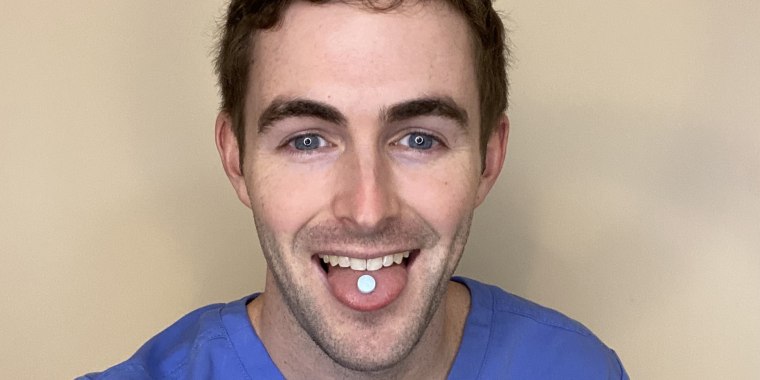Wearing blue scrubs and balancing a pill on his tongue, Dr. Jake Goodman took a selfie he knew could have consequences for his career.
The recent medical school graduate, who is training to be a psychiatrist, decided to open up about his own mental health, revealing that he takes medication to feel better.
Goodman posted the photo on Instagram last month, receiving thousands of likes and hundreds of comments.
“Many of us will never take medication that can help correct the chemical imbalance in our brains due to medication stigma, the fear that taking medications for our mental health somehow makes us weak. This stigma is rampant in the medical field,” he wrote in the caption.
“My name is Dr. Jake, I’m a physician who treats mental illness, and I take medication for my mental health. And by the way, I’m proud of it,” he wrote.
Depression is widespread among med students, young doctors
Goodman, who lives in Miami, said he always wanted to be a doctor when he was growing up and thought of physicians as superheroes who were unaffected by stress or mental health problems. He never saw doctors open up about any struggles they were going through.
Now that he’s started his four-year residency at a Florida hospital, Goodman said he was concerned about a culture in medicine, especially in medical training, that expects doctors to keep their mental health problems to themselves.
“Having mental health issues is normal, it’s OK,” Goodman, 29, told TODAY. “You don’t have to be this superhero… it doesn’t make me a worse doctor. It doesn’t make me weak.”
He declined to name the medication he is taking, but was fine sharing he’d been dealing with depression for several months, including symptoms such as feeling numb, burnt out and not himself; experiencing a loss of interest in things he normally enjoyed doing and having difficulty sleeping.
Medication and therapy have helped Goodman feel significantly better — it’s like “night and day,” he said. He’s also an advocate for practicing self-care, including exercise, “one of the best things you can do for your mental health, period. It releases natural endorphins and allows you to disconnect from the daily stresses of life,” he said.
Studies show 27% of medical students and almost 29% of resident physicians have symptoms of depression. A survey of more than 2,000 female physicians found half of them believed they had met the criteria for mental illness, but had not sought treatment because of “substantial and persistent fear” of the stigma.
“There’s just an overall fear that other doctors or other health care professionals or our employers will see us as weak or damaged or unable to treat patients,” Goodman said.
“Physicians are supposed to be these super strong, superhuman people who work long hours and aren’t affected by the stress.”
Doctors are also afraid they won’t receive their medical license in states that require them to disclose if they’ve ever received treatment for mental illness, he noted. Almost 40% of physicians reported they would be reluctant to seek help because of such concerns, a study found.
It’s why Goodman debated whether to post that photo of himself for weeks, but decided it was worth it to try to break the stigma.
Skin cancer diagnosis
Right about the time Goodman was dealing with depression, he was also diagnosed with melanoma. He has a family history of the skin cancer and decided to get a skin check because it had been a while since his last dermatologist visit.
The cancerous spot was on his scalp above his left ear and was covered by hair so Goodman had never seen it himself.

“Who knows how long it had been growing there, but when they actually showed me the picture of it, I would have gone immediately to the doctor if I would have seen that anywhere else on my body,” he recalled.
“The scalp is an area you should make sure that your dermatologist checks, because if they didn’t check that, I would still have a melanoma growing on my scalp.”
The spot was surgically removed in November. It was a melanoma in situ, the earliest stage, so Goodman felt fortunate it was caught early. He now ventures outside covered in sunscreen and wearing a big sun hat.
“It is character building and it taught me all of us have had some sort of situation in our lives where you find out something that rocks your world, shakes beliefs and humbles you,” he said about his ordeal.
“Being blessed and happy to be alive and be able to do the things I want to do and live my dreams, that’s an amazing thing. I think it gave me a new outlook on life.”

